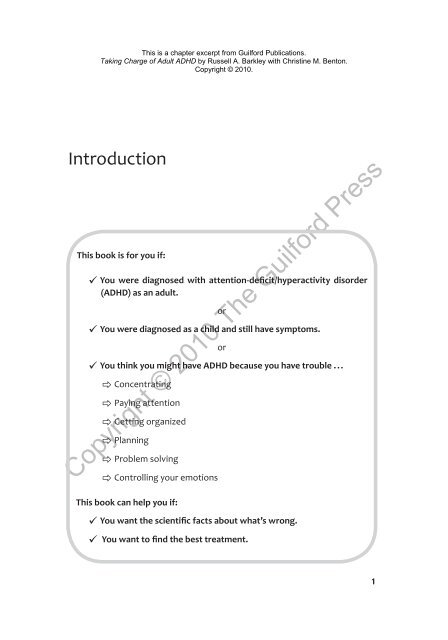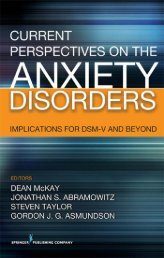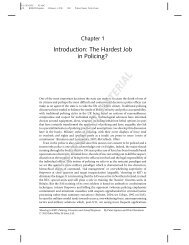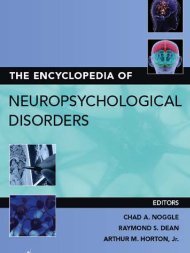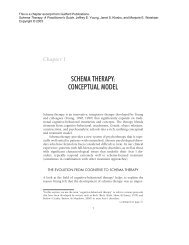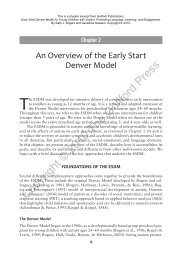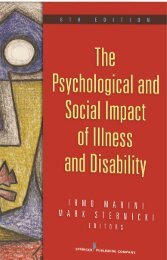Sample Chapter: Taking Charge of Adult ADHD - Nmhrc.com
Sample Chapter: Taking Charge of Adult ADHD - Nmhrc.com
Sample Chapter: Taking Charge of Adult ADHD - Nmhrc.com
You also want an ePaper? Increase the reach of your titles
YUMPU automatically turns print PDFs into web optimized ePapers that Google loves.
This is a chapter excerpt from Guilford Publications.<br />
<strong>Taking</strong> <strong>Charge</strong> <strong>of</strong> <strong>Adult</strong> <strong>ADHD</strong> by Russell A. Barkley with Christine M. Benton.<br />
Copyright © 2010.<br />
Introduction<br />
This book is for you if:<br />
99You were diagnosed with attention- deficit/hyperactivity disorder<br />
(<strong>ADHD</strong>) as an adult.<br />
99You were diagnosed as a child and still have symptoms.<br />
99You think you might have <strong>ADHD</strong> because you have trouble . . .<br />
Ö9Concentrating<br />
Ö9Paying attention<br />
Ö9getting organized<br />
Ö9Planning<br />
Ö9Problem solving<br />
or<br />
or<br />
Copyright © 2010 The Guilford Press<br />
Ö9Controlling your emotions<br />
This book can help you if:<br />
99You want the scientific facts about what’s wrong.<br />
99 You want to find the best treatment.<br />
1
2 Introduction<br />
99 You want to learn strategies and skills to over<strong>com</strong>e your symptoms.<br />
99you want to know how to play up your strengths.<br />
<strong>ADHD</strong> is real. And it’s not a condition that affects only kids. I’ve spent<br />
more than 35 years treating, researching, and teaching others about <strong>ADHD</strong>.<br />
for most <strong>of</strong> those years, few people believed adults had <strong>ADHD</strong>. Now we<br />
know from closer study that as many as two- thirds <strong>of</strong> the children who<br />
have <strong>ADHD</strong> will still have it when they grow up. This means 4–5% <strong>of</strong> all<br />
adults have <strong>ADHD</strong>. That’s more than 11 million adults in the United States<br />
alone.<br />
If you’re among them—or you think you might be—this book is for<br />
you. I wrote it because I think you should reap the benefit <strong>of</strong> everything<br />
we’ve learned from decades <strong>of</strong> research. <strong>ADHD</strong> is probably among the<br />
most extensively studied <strong>of</strong> all mental or emotional disorders. In fact, the<br />
information and advice in this book is based on more than 7,000 research<br />
studies on this disorder that have been published over the last century.<br />
We’ve arrived at a very good understanding <strong>of</strong> what <strong>ADHD</strong> is. We<br />
know a lot about how it affects the brain. We have a clearer view than<br />
ever <strong>of</strong> how and why the symptoms make your daily life seem like one long<br />
uphill climb.<br />
Best <strong>of</strong> all, we have treatments that are so effective that many adults<br />
end up feeling as if the playing field has been leveled for them for the first<br />
time ever. You’ll learn about them in the following pages. And based on a<br />
theory I’ve developed about the nature <strong>of</strong> <strong>ADHD</strong>, this book also <strong>of</strong>fers you<br />
a collection <strong>of</strong> strategies that can turn your life around at work, at home,<br />
in college, and with your family and friends. These strategies are based on<br />
a scientific understanding <strong>of</strong> what’s behind your symptoms, and they can<br />
help you be successful everywhere it’s important to you. It’s only what<br />
you deserve.<br />
Copyright © 2010 The Guilford Press
step One<br />
To geT STARTeD,<br />
geT evAluATeD<br />
“Time escapes me, and I can’t deal with it effectively like other adults.”<br />
“My mind and my life are a jumbled mess. I <strong>of</strong>ten can’t seem to organize my<br />
work or other activities anywhere near as well as the other adults I know.”<br />
“I know that I flit from one thing to another and one project to another, and it<br />
drives the people I have to work with crazy. But I have to do things as soon as<br />
I think <strong>of</strong> them, because if I don’t, I’ll forget about them, and then they never<br />
get done.”<br />
“As a kid, I was always the one who had a hard time sitting still and had all<br />
<strong>of</strong> this energy and no clue what to do with it. I always felt like an outcast,<br />
and I hated it. I remember having to go to the nurse’s <strong>of</strong>fice every day to take<br />
my meds—it was the worst feeling! No one wanted to be friends with me<br />
because I did not fit in with the group. I will never be the quiet, calm, reserved<br />
girl in the crowd. I am that outgoing, sometimes loud (OK, more <strong>of</strong>ten than I<br />
would like to admit), intense, somewhat nerdy, sarcastic, funny girl that suddenly<br />
everyone likes to be around.”<br />
Copyright © 2010 The Guilford Press<br />
3
4 TO GET STARTED, GET EVALUATED<br />
“So here is what happened last weekend that my wife is so upset about. I get<br />
out the lawn mower Saturday morning to cut the grass. But the gas can is<br />
empty. So I throw it in my Ford Explorer and drive down to the quickie mart<br />
for gas, and while I am filling up the can, a best friend pulls in to fill up. He’s as<br />
much an addict about trout fishing as I am. And he says he has an extra pole<br />
and waders, so why don’t we hit the stream for a little fishing. So I say ‘yeah’<br />
and get into his car and leave mine at the gas station. We fish for an hour or<br />
so, and then we’re thirsty and hit this great little bar that guys love to hang<br />
out at and have a beer. It’s now three in the afternoon, and I finally get back<br />
to the gas station for my car, and the state police are there. You see, my wife<br />
called them when I didn’t return home after several hours from getting the<br />
gas for the mower, thinking something bad had happened to me. She was so<br />
furious with me when she found out what I had done that she wouldn’t talk to<br />
me for days! But that’s how I am—I just go with the flow <strong>of</strong> what’s happening<br />
around me and can’t remember what it was I was supposed to get done, or I<br />
just blow it <strong>of</strong>f as less interesting than what I might have a chance to do.”<br />
Copyright © 2010 The Guilford Press
1<br />
Is It Possible That You<br />
Have <strong>ADHD</strong>?<br />
Do the experiences you just read about sound familiar? These are the voices<br />
<strong>of</strong> adults with <strong>ADHD</strong>. The first <strong>com</strong>ment strikes at the very heart <strong>of</strong> what <strong>ADHD</strong><br />
is. It’s a succinct description <strong>of</strong> the serious time management problems that<br />
<strong>ADHD</strong> creates for adults in their daily lives.<br />
Do you feel like you’re <strong>of</strong>ten out <strong>of</strong> sync with the clock, with schedules<br />
and agendas? Always late or scattered or unsure what to do with the limited<br />
hours in your day? If so, you know it’s no fun feeling like you’re constantly letting<br />
yourself and others down by missing deadlines and appearing to stand<br />
people up for dates and appointments. You know it’s hard to maintain a sense<br />
<strong>of</strong> adult ac<strong>com</strong>plishment and <strong>com</strong>petence when those around you think they<br />
can’t count on you to get things done. Maybe it’s time to change all that.<br />
HOw wOulD yOu DescRiBe yOuR PROBlems?<br />
Of course time management troubles aren’t caused only by <strong>ADHD</strong>. But if you<br />
share some <strong>of</strong> the other problems described by the people above, <strong>ADHD</strong> might<br />
be the culprit. And if it is, there’s a lot you can do to change your life for the<br />
better.<br />
Quickly run through this list and check <strong>of</strong>f each question you’d answer<br />
with a “yes.”<br />
Copyright © 2010 The Guilford Press<br />
Do you have trouble concentrating?<br />
Are you easily distracted?<br />
Do you consider yourself highly impulsive?<br />
Do you have trouble getting or staying organized?<br />
5
6 TO GET STARTED, GET EVALUATED<br />
Do you find yourself unable to think clearly?<br />
Do you feel like you always have to be busy doing lots <strong>of</strong> things—but<br />
then you don’t finish most <strong>of</strong> them?<br />
Do people say you talk too much?<br />
Is it hard for you to listen closely to others?<br />
Do you jump in and interrupt others when they’re<br />
talking or doing something—and then wish you<br />
had thought first?<br />
Does your voice seem to carry over everyone<br />
else’s?<br />
Do you struggle to get to the point <strong>of</strong> what you’re trying to say?<br />
Do you <strong>of</strong>ten feel restless inside?<br />
<br />
You’ll find a<br />
list <strong>of</strong> 91 additional<br />
symptoms associated<br />
with <strong>ADHD</strong>, gathered<br />
from a study we did<br />
over 7 years, in the<br />
Appendix.<br />
Do you find yourself forgetting things that need to get done but are<br />
not urgent?<br />
Only a pr<strong>of</strong>essional evaluation can tell you for sure whether you have<br />
<strong>ADHD</strong>. But the more questions you answered “yes,” the more likely it is that<br />
you have this disorder. What I can tell you right now is that reams <strong>of</strong> scientific<br />
data show an association between <strong>com</strong>plaints like these—and hundreds <strong>of</strong><br />
similar ones—and <strong>ADHD</strong> in adults.<br />
The data also tell us how severe the fallout can be. <strong>ADHD</strong> can make people<br />
spend their paycheck on something fun right now—and never save enough<br />
money for their monthly or annual bill payments or for that vacation or car or<br />
house they’ll want even more tomorrow than the purchase that seemed irresistible<br />
today. It can make them bet it all on an investment that a little patience<br />
and research would have revealed as a bad risk. It can make you say and do<br />
all kinds <strong>of</strong> things you later regret. Sound familiar?<br />
But, you might be thinking, I can’t possibly have <strong>ADHD</strong>. I’m not hyperactive!<br />
My brother (or sister, nephew, childhood pal, classmate) had <strong>ADHD</strong> when<br />
we were kids, and he was constantly<br />
You don’t have to be hyperactive fidgety, restless, and “hyper,” always acting<br />
out in some embarrassing way. I’m<br />
 to have adult <strong>ADHD</strong>.<br />
not like that.<br />
One <strong>of</strong> the things we’re beginning to understand well about adult <strong>ADHD</strong><br />
is that hyperactivity is seen more in kids with the disorder—but then it usually<br />
declines substantially by adolescence and adulthood. Often the only thing<br />
Copyright © 2010 The Guilford Press
Is It Possible That You Have <strong>ADHD</strong>? 7<br />
What we know about adults with <strong>ADHD</strong> <strong>com</strong>es straight from scientific<br />
fact:<br />
• Data since 1991 from the university <strong>of</strong> Massachusetts Medical<br />
School, where one <strong>of</strong> the first clinics in the United States for adults<br />
with <strong>ADHD</strong> was established<br />
• evidence from a study <strong>of</strong> 158 children with <strong>ADHD</strong> (and 81 without<br />
it) followed into adulthood, one <strong>of</strong> the largest such studies ever<br />
done<br />
that’s left <strong>of</strong> hyperactivity in adults with <strong>ADHD</strong> is that feeling <strong>of</strong> restlessness<br />
and the need to keep busy that you may know well.<br />
If you think you might have <strong>ADHD</strong>, there are good reasons to seek an<br />
evaluation:<br />
99We’re <strong>com</strong>ing up with lots <strong>of</strong> answers that could help you. <strong>Adult</strong> <strong>ADHD</strong><br />
is be<strong>com</strong>ing well understood by science even though the disorder<br />
hasn’t been recognized in adults for that long.<br />
99This disorder can hurt you more than a lot <strong>of</strong> other psychological<br />
problems—and it can hurt you every day, everywhere you go. <strong>ADHD</strong><br />
is more limiting in more areas <strong>of</strong> adult life than most other disorders<br />
seen in outpatient mental health clinics.<br />
99And there’s a lot more help, in the form <strong>of</strong> effective treatment options<br />
and coping strategies, than for a lot <strong>of</strong> other disorders that affect adults.<br />
<strong>ADHD</strong> is one <strong>of</strong> the most treatable psychological disorders.<br />
Copyright © 2010 The Guilford Press<br />
HOw lOng HAve yOu HAD THese PROBlems?<br />
If you think about how long you’ve been struggling to manage your time, to<br />
concentrate, and to control your impulses, would you say it’s been just weeks<br />
or months or more like years? Picture yourself as a child: Were you dealing<br />
with any <strong>of</strong> the same problems then? Do you remember also having trouble<br />
sitting still in school? Finishing a hobby project? Following the rules on a playing<br />
field?
8 TO GET STARTED, GET EVALUATED<br />
The adults with <strong>ADHD</strong> that I’ve studied, diagnosed, and treated have varying<br />
memories <strong>of</strong> the types <strong>of</strong> problems you checked <strong>of</strong>f earlier. Many were not diagnosed<br />
as kids. Sometimes their pediatrician didn’t believe <strong>ADHD</strong> was real. Or<br />
their parents didn’t think “being hyper or not being able to focus was a reason to<br />
take a child to the doctor,” as one man diagnosed in his mid- twenties reported.<br />
These people may have bought the myth that there was nothing wrong with<br />
them that sheer willpower wouldn’t cure. Sometimes people end up undiagnosed<br />
because they fall into a gray area between <strong>ADHD</strong> and non-<strong>ADHD</strong> symptoms<br />
or because they had other problems that muddied the picture.<br />
Going undiagnosed as a child doesn’t mean you don’t have <strong>ADHD</strong>.<br />
Having less severe problems managing<br />
time, concentrating, and control-<br />
Having sudden, short-term symptoms<br />
 usually rules out <strong>ADHD</strong>.<br />
ling impulses than you did as a child<br />
doesn’t mean you don’t have <strong>ADHD</strong>.<br />
Being hyperactive as a child but not as an adult doesn’t mean you don’t<br />
have <strong>ADHD</strong>.<br />
But not having any <strong>ADHD</strong> symptoms as a child probably does mean you<br />
don’t have <strong>ADHD</strong>. <strong>ADHD</strong>-like symptoms that arose only in adulthood or that<br />
haven’t been going on for very long are probably being caused by something<br />
else—a brain injury or other physical illness, for example.<br />
<strong>of</strong> all cases <strong>of</strong> <strong>ADHD</strong> we’ve diagnosed in our various clinics and<br />
studies, 98% started before age 16.<br />
If you don’t clearly remember having the same problems you just noted<br />
when you were a child, is there someone who knew you well then that you<br />
can ask? A parent? Brother or sister? Ironically, the same problems that make<br />
it hard for people with <strong>ADHD</strong> to get things done on time, make wise choices,<br />
and even get along with others can make it tough for them to trace their own<br />
history accurately—at least until they’ve reached approximately their mid- to<br />
late 20s. I’ll explain why in Step Two.<br />
Copyright © 2010 The Guilford Press<br />
?<br />
I didn’t have any problems as a child, and I haven’t had any brain<br />
injuries. Isn’t it possible that <strong>ADHD</strong> hasn’t caused me any problems<br />
till now because <strong>of</strong> my intelligence? I scored high on IQ tests in<br />
elementary school.
Is It Possible That You Have <strong>ADHD</strong>? 9<br />
Except in school and possibly at work, intelligence is unlikely to protect you<br />
from experiencing impairments. Intelligence is not the only factor involved in<br />
domains like family and social functioning, driving, crime and drug use, dating<br />
and marital relationships, and, in fact, most others. High intelligence wouldn’t<br />
necessarily have protected you in these areas if you had <strong>ADHD</strong> symptoms.<br />
Sudden appearance <strong>of</strong> problems in adulthood is highly likely to be caused by<br />
something other than <strong>ADHD</strong>.<br />
?<br />
Children and teens with <strong>ADHD</strong> that I’ve followed up into adulthood<br />
<strong>of</strong>ten don’t know the extent <strong>of</strong> their own symptoms or how much<br />
those symptoms are interfering with their life. it’s not until 27–32 years<br />
<strong>of</strong> age that adults with <strong>ADHD</strong> be<strong>com</strong>e more consistent in what they<br />
say about themselves relative to what others say about them.<br />
I think I may have <strong>ADHD</strong> now even though I didn’t have any concentration<br />
or other problems when I was younger. Maybe I was just<br />
<strong>com</strong>pensating for my <strong>ADHD</strong> in other ways?<br />
In our research, the average number <strong>of</strong> major life activities in which adults<br />
with <strong>ADHD</strong> said they were <strong>of</strong>ten impaired was 6 or 7 out <strong>of</strong> 10. <strong>ADHD</strong> causes<br />
serious impairment across all the domains <strong>of</strong> adult life, from education to work<br />
to family. It would be nearly impossible to make it through childhood, adolescence,<br />
and even early adulthood by “<strong>com</strong>pensating”<br />
somehow. Most pr<strong>of</strong>essionals Symptoms must have lasted<br />
would have a hard time accepting the idea  for at least 6 months to be<br />
that <strong>ADHD</strong> had not interfered with a person’s<br />
functioning until adulthood without<br />
considered in diagnosing <strong>ADHD</strong>.<br />
strong evidence that parents and schools had made extraordinary efforts to<br />
help. <strong>ADHD</strong> is defined by lack <strong>of</strong> <strong>com</strong>pensation during the childhood years—<br />
not by successful <strong>com</strong>pensation during those years!<br />
Copyright © 2010 The Guilford Press<br />
wHAT ARE yOuR symPTOms?<br />
Only a qualified pr<strong>of</strong>essional can help you fully answer that question. Still,<br />
checking <strong>of</strong>f any <strong>of</strong> the following questions that you’d answer “yes” will help<br />
you figure out whether to pursue a diagnostic evaluation. In our research
10 TO GET STARTED, GET EVALUATED<br />
aimed specifically at understanding adult <strong>ADHD</strong>, we’ve found the following<br />
nine criteria most accurate in identifying the disorder.<br />
Do you <strong>of</strong>ten . . .<br />
easily get distracted by extraneous stimuli or irrelevant thoughts?<br />
Make decisions impulsively?<br />
Have difficulty stopping activities or behavior when you should do so?<br />
Start a project or task without reading or listening to directions carefully?<br />
fail to follow through on promises or <strong>com</strong>mitments you make to others?<br />
Have trouble doing things in their proper order or sequence?<br />
Drive much faster than others—or, if you don’t drive,<br />
have difficulty engaging in leisure activities or doing<br />
fun things quietly?<br />
Have difficulty sustaining attention in tasks or recreational<br />
activities?<br />
Have difficulty organizing tasks and activities?<br />
<br />
The fourth edition <strong>of</strong> the Diagnostic and Statistical Manual <strong>of</strong><br />
Mental Disorders (DSM-IV), published by the American Psychiatric<br />
Association, uses 18 symptoms to diagnose <strong>ADHD</strong>—9 focusing<br />
on inattention and 9 on hyperactivity– impulsivity. But that list<br />
(see the Appendix) was developed for use with children only.<br />
My associates and I have <strong>com</strong>piled research data showing that<br />
the list <strong>of</strong> 9 symptoms above is more useful with adults. A<br />
research colleague <strong>of</strong> mine, Stephen faraone, PhD, has done an<br />
independent study with his own groups <strong>of</strong> adults showing that<br />
these symptoms were very good at identifying those having<br />
<strong>ADHD</strong>.<br />
Information<br />
on finding a<br />
pr<strong>of</strong>essional to<br />
evaluate you is<br />
in <strong>Chapter</strong> 3.<br />
Copyright © 2010 The Guilford Press
Is It Possible That You Have <strong>ADHD</strong>? 11<br />
Did you check <strong>of</strong>f four <strong>of</strong> the first seven symptoms on this list, or six <strong>of</strong><br />
all nine symptoms? If so, you are highly likely to have <strong>ADHD</strong>. In that case you<br />
should seek an evaluation from an experienced mental health pr<strong>of</strong>essional if<br />
you have not done so already.<br />
<br />
HOw DO THese symPTOms AFFecT yOuR liFe?<br />
<strong>ADHD</strong> is not a category that you either fall into or don’t. It is not like pregnancy.<br />
It’s more like human height or intelligence. Think <strong>of</strong> it as a dimension, with<br />
different people falling at different points along it.<br />
So where on that dimension is the division between<br />
“disorder” and “no disorder”? It’s where impairment in<br />
a major life activity occurs. Symptoms are the ways<br />
a disorder expresses itself in thoughts and actions.<br />
Impairments are the adverse consequences that result<br />
from showing those symptoms. The table below lists<br />
typical impairments caused by <strong>ADHD</strong> in childhood<br />
and beyond.<br />
Step Five gives<br />
specific strategies<br />
for preventing <strong>ADHD</strong><br />
symptoms from causing<br />
the impairments listed<br />
in the table.<br />
Typical childhood<br />
impairments<br />
Family stress and conflict<br />
Poor peer relationships<br />
Few or no close friendships<br />
Disruptive behavior in stores,<br />
church, and other <strong>com</strong>munity<br />
settings to the extent that you<br />
are asked to leave or not return<br />
Typical adolescent and adult<br />
impairments<br />
Copyright © 2010 The Guilford Press<br />
Low regard for personal safety/<br />
increased accidental injuries<br />
Slow development <strong>of</strong> self-care<br />
Poor functioning at work<br />
Frequent job changes<br />
Risky sexual behavior/increased teen<br />
pregnancy and sexually transmitted<br />
diseases<br />
Unsafe driving (speeding, frequent<br />
accidents)<br />
Difficulties managing finances (impulsive<br />
spending, excessive use <strong>of</strong> credit cards,<br />
poor debt repayment, little or no savings,<br />
etc.)<br />
Problems in dating or marital relationships<br />
(cont.)
12 TO GET STARTED, GET EVALUATED<br />
Typical childhood<br />
impairments<br />
Typical adolescent and adult<br />
impairments<br />
Slow development <strong>of</strong> personal<br />
responsibility<br />
Significantly lower than average<br />
school performance<br />
Significantly fewer years <strong>of</strong><br />
schooling<br />
Less <strong>com</strong>mon but notable:<br />
Antisocial activities (lying, stealing,<br />
fighting) that lead to frequent police<br />
contact, arrests, and even time in jail; <strong>of</strong>ten<br />
associated with a greater risk for illegal<br />
drug use and abuse<br />
Generally less healthy lifestyle<br />
(less exercise; more sedentary selfentertainment,<br />
such as video games, TV,<br />
surfing the Internet; obesity, binge eating<br />
or bulimia, poorer nutrition; greater use <strong>of</strong><br />
nicotine and alcohol), and consequently an<br />
increased risk for coronary heart disease<br />
What’s Next?<br />
Now you should have a fairly good idea <strong>of</strong> whether you might have <strong>ADHD</strong> and<br />
should consider a pr<strong>of</strong>essional evaluation:<br />
Do you have at least four to six <strong>of</strong> the nine symptoms now?<br />
Do they occur <strong>of</strong>ten in your current life?<br />
Have you been having these troubles for at least 6 months?<br />
Did they develop in childhood or adolescence (before 16 years <strong>of</strong> age)?<br />
Have your current symptoms resulted in adverse consequences (impairment)<br />
in one or more major domains (education, work, social relationships,<br />
dating or marital relationships, managing your money, driving,<br />
etc.)?<br />
Copyright © 2010 The Guilford Press<br />
Did you experience adverse consequences from these symptoms in<br />
childhood?<br />
If you can answer “yes” to all <strong>of</strong> these questions, there is a high probability<br />
that you have <strong>ADHD</strong>. Read on to find out what you can do about it.<br />
Copyright © 2010 The Guilford Press. All rights reserved under International Copyright Convention. No part<br />
<strong>of</strong> this text may be reproduced, transmitted, downloaded, or stored in or introduced into any information<br />
storage or retrieval system, in any form or by any means, whether electronic or mechanical, now known or<br />
hereinafter invented, without the written permission <strong>of</strong> The Guilford Press.<br />
Guilford Publications, 72 Spring Street, New York, NY 10012, 212-431-9800. www.guilford.<strong>com</strong>/p/barkley18


